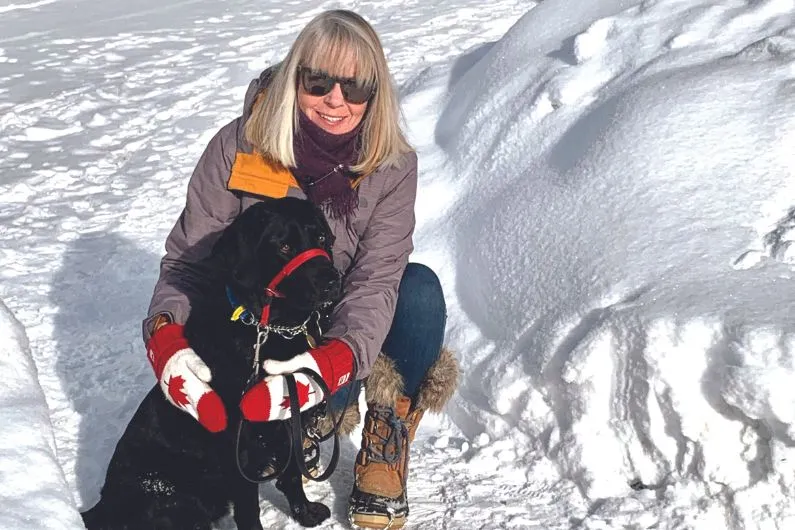Written by Sophie Cullen, Travel Without Limits, April 24, 2024
Every dog must have its day! But this dog had more than a big day out – it flew to Canada, frolicked in the snow on a holiday and was a trailblazer for every pooch with wanderlust.
Debbie King started skiing when she was five years old, and it has been part of her life and her travels ever since.
These days, Debbie and her husband spend as much time as they can at Sun Peaks Resort in British Columbia, with Debbie estimating they’ve spent a cumulative two years’ worth of winters there in recent years.
“At the age of 60,” she laughs, “I decided it was time to become a ski bum!”
But their most recent Canadian ski season was a bit different, with the addition of a third eager traveller. She might have four legs, but Zazu loved Canada and the snow just as much as Debbie.
“What was I thinking?” says Debbie about making an overseas trip with an assistance dog.
“But all’s well that ends well, and it was so nice to be able to share our happy place with our newest family member.”
Zazu had been with Debbie, who lost her vision at 52, for 18 months when they decided to return to Canada.
“The whole process of taking a dog out of Australia and bringing it back is huge,” says Debbie.

She recommends starting by logging on to the Department of Agriculture, Fisheries and Forestry website and working your way through their instructions. The Department encourages those travelling for less than six months to begin the process at least six months before departure.
A rabies vaccination is a crucial step. It has to be accompanied by an RNATT (Rabies Neutralising Antibody Titre Test) certification. You have to wait a few weeks between the vaccination and the test, which means timing is everything. So too is having a vet you can trust who is familiar with international travel, both at home and in your destination.
“Everything that you do with the dog has to be done properly, and has to be certified by the vet,” says Debbie, including the parasite treatments, vaccinations, microchip records and blood tests that Zazu needed while they were overseas. “You’ve got to get it right the first time.”
These contacts proved invaluable when a canine influenza vaccine required for Australian re-entry was unavailable in Canada.
“The worst scenario was happening for us,” says Debbie, who got in touch with as many vets as she could in British Columbia, Alberta and along the US border, as well as the Canadian Food Inspection Authority and Seeing Eye Dogs Australia. This network was able to locate a vaccine 600km away which was put aside for Zazu.
With a potential crisis averted, Debbie insists that none of it would have been possible without the support they had from friends and connections they’d made in Canada. It helped that Debbie and her husband were familiar with Canada, and that the country itself is very accessible and familiar with assistance dogs.
And of course, boasts incredible scenery, snow and snow sports, including a fantastic adaptive ski program at Sun Peaks.
“For someone who loves the snow, to be living in a place like that is just like ending up in heaven!” says Debbie.

Zazu fell in love too, often joining Debbie and her husband on snowshoeing expeditions and having great fun playing in the snow.
“We were still able to do the things we’ve always done” says Debbie, but there were a few surprising learning curves for everyone.
Zazu, for example, had to adjust to cars coming from the other direction, and had to be taken to the local carpark to wear out her toenails after so much time walking in snow. And Debbie had to adjust to taking Zazu outside in subzero temperatures for a toilet break!
“When you’ve got a dog, you still have to do all the dog things!” she says.
And how did Zazu go with the flying? In Debbie’s words, she was “an absolute champion” and “a real professional”.
Officials or volunteers were available at each airport to see them through security and beyond, and layovers were useful for stops at service dog toilets. Debbie packed extra carry-on with dog wipes, bowl, waterproof bag, extra harness, Nylabone, toys, a small amount of food, absorbent mat, and urine pads just in case, having trained Zazu to use these back home. While everyone was asleep en route to Vancouver, Debbie and Zazu would stretch their legs up and down the aisles.
Returning home also involved tight timelines for parasite treatments, stamped paperwork and final approval. Debbie had to book a second flight in case the first was cancelled, with a government vet and biosecurity officers waiting as soon as they stepped off the plane.
Because Zazu was cleared as an assistance dog, she was able to complete her quarantine period at home. A vet visited on the tenth day to check in.
“It’s doable,” Debbie affirms about travelling with an assistance dog, but says you need to be prepared for some hiccups. “I’d say get as much information as you can about what you’ll need, and then decide if it’s for you or not.”
